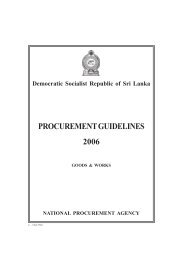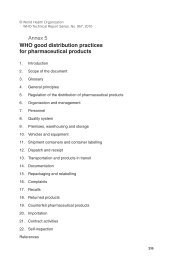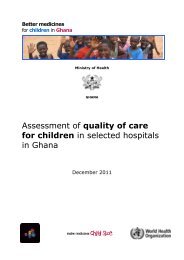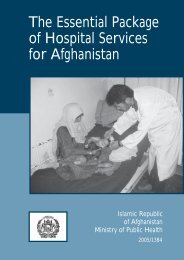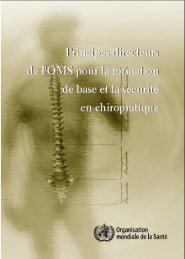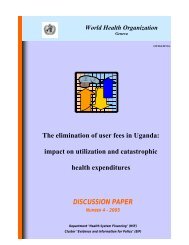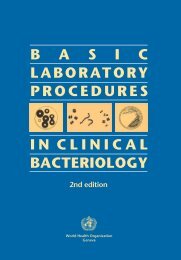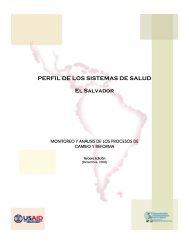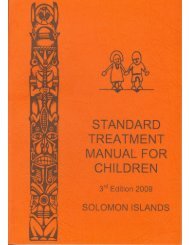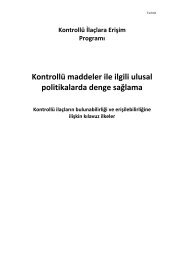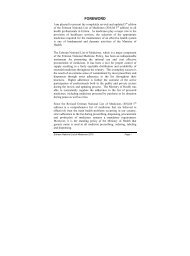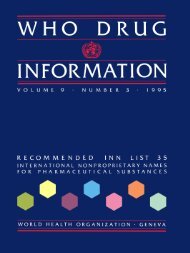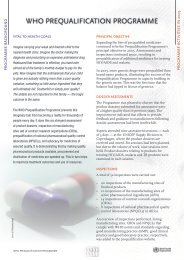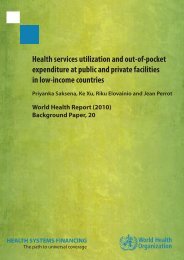WHO Drug Information Vol. 24, No. 4, 2010
WHO Drug Information Vol. 24, No. 4, 2010
WHO Drug Information Vol. 24, No. 4, 2010
You also want an ePaper? Increase the reach of your titles
YUMPU automatically turns print PDFs into web optimized ePapers that Google loves.
<strong>WHO</strong> <strong>Drug</strong> <strong>Information</strong> <strong>Vol</strong>. <strong>24</strong>, <strong>No</strong>. 4, <strong>2010</strong>Regulatory Action and Newsand use of the pain reliever propoxyphenebecause new data show that thedrug can cause serious toxicity to theheart, even when used at therapeuticdoses. FDA has requested that companiesvoluntarily withdraw propoxyphenefrom the United States market.Propoxyphene is an opioid pain relieverused to treat mild to moderate pain. It issold under various names as a singleingredientproduct (e.g., Darvon®) and aspart of a combination product with acetaminophen(e.g., Darvocet®).The recommendation is based on allavailable data including data from a newstudy that evaluated the effects thatincreasing doses of propoxyphene haveon the heart. FDA has concluded that thesafety risks of propoxyphene outweigh itsbenefits for pain relief at recommendeddoses.Reference: FDA <strong>Drug</strong> Safety Communication,19 <strong>No</strong>vember <strong>2010</strong> at http://www/fda.govSitaxentan: worldwidewithdrawalAustralia — The Therapeutic GoodsAdministration (TGA) has advised that thesupply of the prescription medicinesitaxentan (Thelin®) will be suspended.The company that supplies the medicinehas announced that it will withdrawThelin® from the market globally.Sitaxentan is a prescription-only medicineused to treat pulmonary hypertension.Patients currently taking sitaxentanshould contact their physician as soon aspossible to organize the supply of adifferent medicine but should not ceasetheir use of sitaxentan until they havebeen assessed and switched to anothermedication.This action has been taken in response toa review of safety data in clinical trialsthat showed patients were at risk of acuteliver failure that in some cases was notreversible. The TGA has received 10adverse event reports of abnormal liverfunction in Australian patients receivingsitaxentan.Reference: TGA Safety Alert, 10 December<strong>2010</strong> at http://www.tga.gov.au/alerts/medicines/thelin-withdrawal.htmSibutramine: suspensionof salesSingapore — The Health SciencesAuthority (HSA) has taken a regulatorydecision to suspend the sales ofsibutramine products following a benefitriskassessment which took into considerationthe findings from the SibutramineCardiovascular Outcomes (SCOUT)study, use of the product in the localcontext and developments in otherinternational jurisdictions.Sibutramine is licensed in Singaporesince 2001 for use as an adjunctivetherapy to diet and exercise for obesepatients with a body mass index (BMI)>30kg/m 2 , or for overweight patients witha BMI >27kg/m 2 with other obesity-relatedrisk factors such as Type 2 diabetesmellitus or dyslipidaemia.The SCOUT study was a randomized,double-blind, placebo-controlled, multicentrestudy conducted in approximately10 000 patients aged ≥55 who wereobese or overweight and had a history ofcardiovascular (CV) disease and/or type2 diabetes with at least one other CV riskfactor treated over a six year period. Thestudy results showed that there was a16% increase in the risk of a primaryoutcome event of nonfatal myocardialinfarction (MI), nonfatal stroke, resuscitatedcardiac arrest and CV death in thesibutramine group as compared with theplacebo group. This was driven primarilyby increase in rates of nonfatal MI andnonfatal stroke seen in the sibutraminegroup. A review of the serious adverse307



